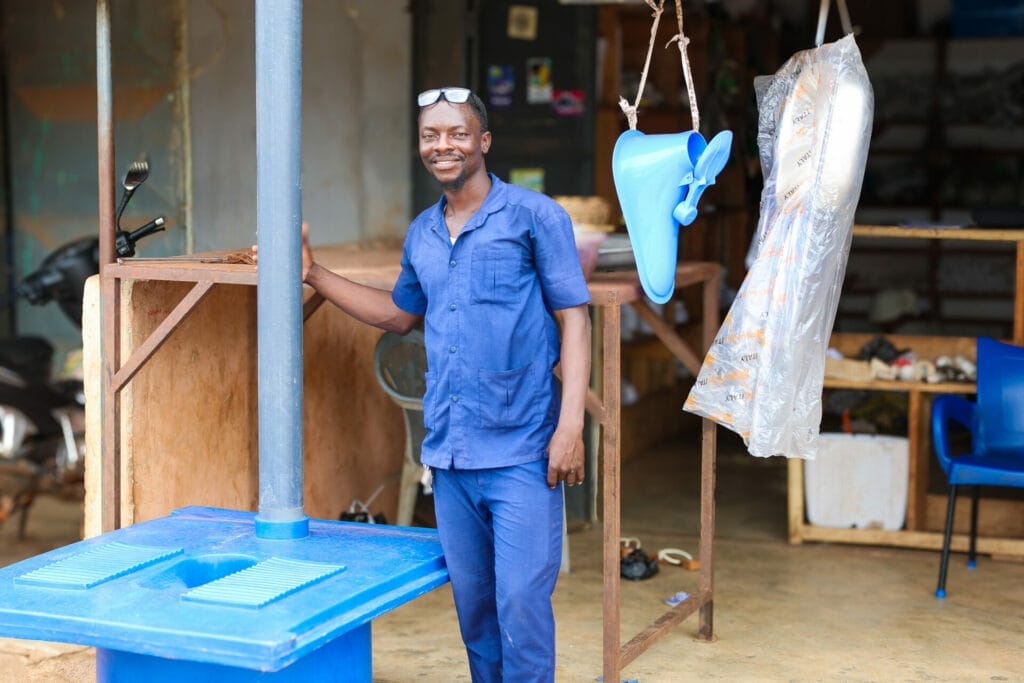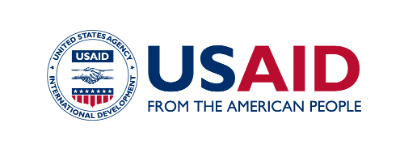News > Blog
Local Plumber Turned Entrepreneur Champions Sanitation for All in Ghana
Published 11/23/2024 by Global Communities

In the bustling district of Sagnarigu, Ghana, one name is quickly becoming synonymous with positive change: Awal. As a Digni-Loo entrepreneur under Enhancing WASH (En-WASH), an activity funded by the United States Agency for International Development (USAID), Awal has turned his vision of sustainable sanitation into a reality, one toilet at a time.
Awal’s journey began in 2023. As a small plumbing business owner, he had long harbored the desire to do something bigger for his community. When the Digni-Loo initiative arrived through En-WASH, he seized the opportunity.
“I wanted to be part of a solution that addresses a critical need,” he says. “Sanitation has always been a challenge here, and I knew improving it could change lives.”
The road was not easy, however, as skepticism ran deep in the community and people viewed the Digni-Loo as just another expensive project with no lasting benefit. Awal’s initial efforts to promote the sanitation solution were met with resistance.
“People didn’t trust it,” he recalls. “They thought it wouldn’t last, or it was too costly.”

Undeterred, Awal took a grassroots approach. He leveraged his existing relationships to build trust, educate residents on the long-term health benefits of the Digni-Loo and dispel fears about cost. He organized community meetings, consulted local leaders and conducted house-to-house visits to demonstrate the product firsthand. To break down financial barriers, Awal offered flexible payment plans, allowing more families to afford the Digni-Loo.
His persistence paid off. Over the past year, Awal has helped install more than 30 Digni-Loos and resilient latrines in Sagnarigu and neighboring areas. As a result, there has been a significant reduction in waterborne diseases and a noticeable improvement in overall community health.
What’s more, Awal’s work is inspiring a new generation of sanitation advocates. He now leads a team of five young men, whom he mentors in entrepreneurship and public health.
“Seeing the ripple effect of what I’ve started is incredibly rewarding,” he says.
Yet, Awal’s ambitions stretch far beyond the successes of today. He envisions expanding his work to more remote areas and introducing complementary products to further improve sanitation and hygiene.
“My dream is to see every household in Sagnarigu equipped with a Digni-Loo,” he says. “I believe it’s possible with continued effort and community support.”

Awal’s story highlights how local entrepreneurs can drive lasting change in their communities, overcoming obstacles through persistence and ingenuity. His work underscores the importance of grassroots engagement, innovative financing and a relentless commitment to public health.
“When you’re passionate about a cause and committed to making a difference, nothing is impossible,” Awal says. “Together, we can build healthier, more resilient communities.”
The impact of such efforts is evident in the achievements of the USAID-funded En-WASH Activity, which began in October 2021 and will continue through September 2026. Through this initiative, 16,217 latrines have been constructed, providing 155,037 people access to basic sanitation services. Additionally, 317 communities have attained Open Defecation Free (ODF) status, demonstrating the transformative power of collaboration and local leadership in improving health and sanitation outcomes.

This success story is made possible by the generous support of the American people through the United States Agency for International Development (USAID). The contents are the responsibility of Global Communities and do not necessarily reflect the views of USAID or the United States Government.




